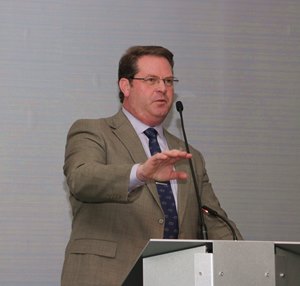HBPA May Call for Medication Advisory Committee


National Horsemen's Benevolent and Protective Association CEO Eric Hamelback unveiled an idea March 15 at the group's convention that would see a diverse group of experts put in place to provide stewards any needed information in medication rulings.
At the National HBPA convention Friday in Clearwater Beach, Fla., Hamelback noted the plan was in its early stages and said he'd welcome ideas on its formation and function, but he believes it could be useful in providing stewards with the latest scientific information as they examine a medication positive.
"It's certainly worth talking about," Hamelback said. "If it comes to fruition, that would be amazing. But, ultimately, I also believe (in) working together—and not worrying about who gets credit for it. But if it works, it would be better for the industry."
Hamelback envisioned the new committee—tentatively named the Stewards Advisory and Review Committee—as a public and private collaboration that functions as a resource for stewards. He said the committee could advise stewards in three areas: policy, practice, and analysis.
Hamelback envisions a committee that includes regulatory officials, equine veterinarians, equine pharmacologists, and equine toxicologists who are recognized as leaders in their field.
Dr. Clara Fenger of the North American Association of Racetrack Veterinarians said such a committee could have prevented trainer Joe Sharp from paying legal fees in a methamphetamine positive from 2017 in New Jersey that was recently thrown out.
"We want to ensure our industry's integrity—it is essential for all equine testing to work properly," Hamelback said. "The critical task of determining the validity of the test result should be to those who are, and have been, working and understanding the legal and technical issues that are involved."
Hamelback said this type of committee could provide assistance based on experience in and knowledge of precedential cases. He envisions it as a single organization—not one in each state—that stewards could contact for expertise on a medication positive they may be considering.
Hamelback plans to outline his initial ideas in April at the Association of Racing Commissioners International conference in Arcadia, Calif., and he welcomes feedback.
At Friday's convention, a pair of attorneys noted such a committee could be problematic because stewards' decisions are viewed as a judicial process and that process might not allow for such input. Lexington-based attorney Doug McSwain, who has represented horsemen in a number of cases and served as National HBPA general counsel, encouraged a bigger educational push on the front end in the rule-making process.
"Stewards function in a judicial capacity on a case-by-case basis," McSwain said. "You'll have to think in terms of what the local jurisdiction's rules are in respect to advice being given to the stewards outside of the record process. Most jurisdictions have a requirement that their judicial functions are to be maintained in an unbiased fashion. A way that could create bias is to have consulting that occurs outside the record review."
National HBPA general counsel Peter Ecabert acknowledged those concerns but said the committee is envisioned as a resource for stewards to call on when expert advice is needed. Hamelback noted ideas on how that would work are still coming together.
